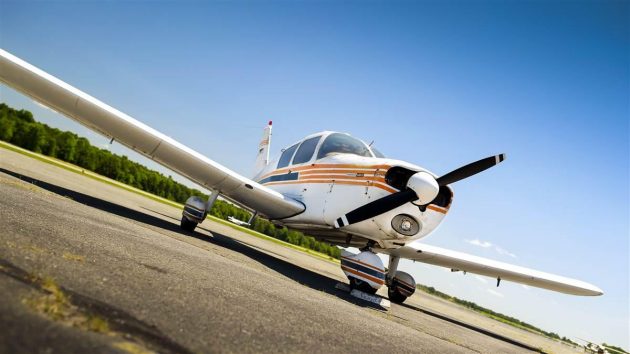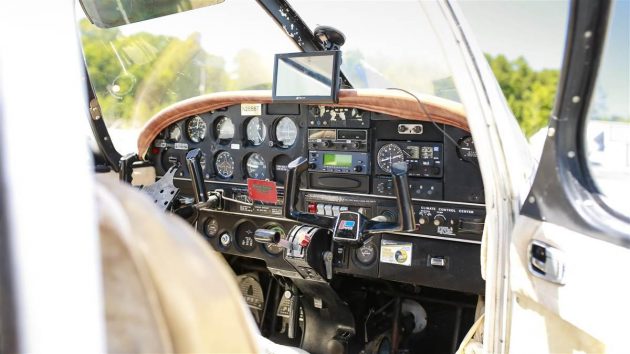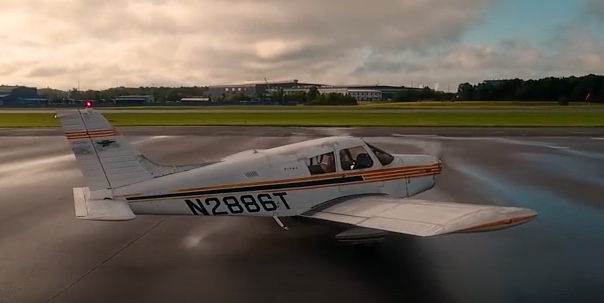Every airport has at least one abandoned airplane, usually, because it needs expensive repair to pass its annual inspection. A few have been written about here on Barnfinds and I’m always quick to say it’s never worth it. The story of this Cherokee left sitting at an airport is different. The owner had purchased it in 1995 and flew it regularly until 2005 when the economy turned bad. Then, the owner was diagnosed with cancer. As a result he could no longer pass his flight physical. The owner had paid his tie down fee for 10 years so there it sat at the Charlotte-Monroe Executive Airport in Charlotte, North Carolina. You can read the story in the new owners own words on a Reddit flying blog and here on his website.
Trying to restore an airplane like this to flying condition is a huge gamble and usually a bad idea. Similar Cherokees in airworthy condition sell for $25,000 to $35,000 dollars but if the logs, airworthiness certificate and other paperwork is gone, the airplane is junk. Fortunately, the owner had removed the paperwork and saved it. Mechanical work will easily exceed the value of the airplane. A rebuild of the O-320 150 HP engine alone would cost at least $15,000 plus the installation cost, but this engine was saved.
The panel was complete, although the radios and navigation instruments are very dated. The new owner has only added the portable GPS you see mounted by a suction cup to the windshield and replace the turn and bank indicator.
The new owner has only invested about $3000 in parts. He has no plans to paint the airplane. Thanks to a deal he made with an A&P (aircraft mechanic) friend, there was no labor cost. So, I’ve been proven wrong. It just might be worth the gamble to purchase and save an abandoned airplane. I’ve flown Cherokees similar to this one and they are nice flying airplanes. The small wing area, thus high wing loading, make them smooth in the bumps, but they do come down like a brick when you pull the power back. For about $4,000 and lots of work over 10 months the new owner has an airworthy airplane. It needs paint and an interior, but it flies and the new owner is enjoying his airplane. Here is a youtube video of an interview with the new owner.







I learned to fly on a PA-28 140 (still called a 140 despite the upgrade to the 150hp Lycoming)
Nicest flying airplane I’ve ever flown
Gentle, forgiving and friendly
I just rode on one of these this last month. ( much nicer) Same type of plane. 1st time in a small plane in probably 30 years, and I LOVED IT!! It was actually a lot bumpier than I remember, all over the place, plus I wished I could have seen over the dash, as the bottom wing restricts your vision. The airplane set is a few notches above the classic car set, which is already beyond mosts reach. It’s not like a car, and I think are always rebuildable. To see 50’s and 60’s airplanes is not uncommon. I think the one I rode in was a ’68.
Did most of my private and commercial in this airplane. Wish it would have had a GPS, of course we didn’t even know what a GPS was back then, just the VOR and hopefully flying VFR. Would love to fly one again.
I also took my initial flight training in a 140…….50 years ago. They are solid roomy airplanes. We are shopping for a plane for my USCG helicopter rescue crewman son right now. The problem with the 140 is power. Useful weight with full fuel is 710 lbs at sea leval ( on a cool day) having spent over a decade in USAF rescue myself, that number is just too skinny for a 4 place aircraft. It is fine for 2 but I have seen way too many accidents with people trying to take off overloaded, either knowingly or by mistake. In the West, it is difficult to fly anywhere without dealing with altitude and heat issues. My brothers traveling plane is a souped up Commanchee, it had a 260 HP Lycoming, retractable gear and is very slippery. It is an appropriate 4 passenger aircraft. Low wing aircraft have much better ground handeling than high wings in general, they can……and usually do…..have wider set more solid gear. These low wing Pipers have wonderful roomy cabins and good build quality, I am more comfortable with the higher horsepower versions. Fuel is the cheepest part of flying and power can save your life. We will probably buy a 210 HP Stinson or an older Bonanaza, the Stinson is a wonderful utility plane that is nearly perfect on back country strips, the Bonanaza has Mercedes like build quality, good power and speed. We just need to find the right deal…….
I had an Aztec (Aztruck because it would haul big payload) for 10 years. Big Hershey bar wing as the 140. Docile, easy to fly. Had over 700 hours flying over the “pond” Chicago to Michigan. Then the downturn, recession, I gave that beautiful bird away for $93k. I researched the tail number. In Venezuela doing gawd knows what. I miss that bird, but after 35 years in GA I miss being up there even more. A 140 would be a perfect replacement. Single engine, fixed gear. Things are better financially now. Maybe sell a car out of the collection and have some fun low and slow. Might as well, I can’t sell the hangers!
I learned to fly on 140s, too. Wonderfully easy airplane to fly.
Amazing how many people here are past 140 pilots. I got my license about a month after I turned 18. When I married my husband 3 years later, we bought a Cessna 150 so he could learn.
Those were the good ol’ days, BK (before kids).
Had a 1942 Taylorcraft L2A Grasshopper before I got married. It was a good idea that it went away as I did not fly enough to be reasonably safe. There are much safer and much less expensive hobbies but flying was/is fun.
A Cherokee 140 is a nice airplane. Maybe a little underpowered but it will still take you where you want to go and bring you back. I logged some hours in an Archer II, a Cherokee 180, and I hated to go back to the Cessna 172, because it (the 172) is–ROUGH, especially on a hot day. I’d be tempted with something like this but an airplane can end up being a money pit. Even if you do a lot of the work yourself, it still has to be signed off by a certified maintenance specialist. Then there’s the radio equipment that is getting dated. I had a quarter share in a ’69 Cessna 172 and the second year we had it, we had navcom problems. By the time we had that wrapped up we had spent just over $12K. We bought the airplane for $17K back in ’81. The annual inspection for the FAA, which is basically a glorified walk-around by the aforementioned specialist, costs at least $1K. And that’s every year whether you fly 1 hour or 500. David’s comment about an engine major being around $15K is pretty accurate. You’d better hope that a certified prop is in there too. If it was a constant-speed prop that alone can cost $15K.
I love flying but if I kept that up I’d have to give up EVERYthing else I love to do, and I love old trucks and cars and tractors, and motorcycles too much. Maybe it I won the Power Ball. I might add that I used to call my Harley Davidson my poor man’s airplane. I had (2) banks out of a radial motor and when the engine quit it was a lot easier to land with a dead stick.
I hope that there is someone out there who will give this plane a good home and will fly it around a lot. While I enjoy my vintage cars and trucks there still isn’t anything like being up in the sky. You really feel like you’re free.
You said it all. If one thinks classic cars are expensive, try anything with wings and quadruple it. Make a Ferrari GTO look like a steal.
Good thing the Wright Brothers were both bachelors !
And then there is this. Not a dry eye in the house. Cars or birds, pass it on so we can save our culture.
https://www.youtube.com/watch?v=nako2qXFrPo
And then there is this. Not a dry eye in the house. Cars or birds, pass it on so we can save our passions.
https://www.youtube.com/watch?v=nako2qXFrPo
It’s only going to work if you can do the work yourself. I bought a 1963 Mooney M20C for $15.000 – it needed tons of work, most of which I did myself under the supervision and sign off of a certified A&P mechanic. Which is a much more interesting plane btw. I flew it on a lot of great trips for a few years – I did spend a lot of money though. Deferred maintenance, and calendar time (no engine likes to sit unrun, especially aircraft engines) caught up with it when it swallowed a valve and I had to make an emergency landing. Glider training paid off that day as I rolled up to the gas pump like Bob Hoover. I got out and spun the prop through like it was a toy airplane. 18K later with an engine rebuild, along with 10K for a show quality paint job it was a perfect, beautiful, safe, reliable airplane. Then I sold it. For a lot more than 15,000, but probably not for went into it, but I had a great time flying and working on it. (The new owner proceeded to wheelbarrow it and bend the prop, break the nose gear and have to tear down the engine on one of his first flights in it.)
A Mooney……dead stick, that would be exciting…..they are just too small for me, A glide slope like a rock……but they are fast and economical travelers. I think they do tend to be high maintenance birds. My wife and I could not sit side by side in the cabin. I managed an FBO for a while, it seemed like Mooneys and 210’s were always in the shop.
One should always feel comfortable landing dead-stick in the airplane they fly. I used to spend an hour or so every month doing dead-stick touch-and-gos in my Archer. Fun!
Off course…….but a planned dead stick, with a known starting point and landing destination, has little relation to an unexpected emergency engine outage probably some distance from a strip in an airplane with little glide slope. All you can hope for is elevation…….and lots of it to give you some options.
plus A&P’s , good ones are getting 1. pretty old, and 2. Getting pretty hard
to find for basically the same reason . I got my ticket in ‘ 55 . I understand
FAA doesn’t even issue them anymore ? Someone correct me if I’m
wrong on this please.
GREAT barnfind (or should I say “ramp find”–for the uninitiated, the tarmac/concrete where the aircraft are parked, at an airport, is called “The Ramp.” I don’t fly but wanted to–and still do!–so badly that, in my youth, I volunteered at an FBO, hoping to get hired. Didn’t happen, but no regrets).
Anyway, my question:
I’m confused–did the new owner get this aircraft FOR FREE, and spend $4,000. in parts, plus whatever body part he sold to his friend, the A & P mechanic?
And hhaleblian:
Thanks for posting “Maddie’s First Solo Flight!”!!! I didn’t have time to watch the whole thing, yet, but viewed the T/O and landing–a perfect “three point landing, right?”
You know…there’s ZERO comments on her youtube video–I was tempted to post a link to this BF conversation, over there, so she could “feel the love,” but that didn’t feel quite right, as it’s not my thread, and our conversation is not mainly about her, but the OP’s PA140.
But I DO think it would be nice if those that are moved by her accomplishment (only 16 y.o.!!!) popped over there an made a brief comment–and maybe even linked back to here, as, who knows–“Maddie” may have an “Old Soul” and be some of the “new blood” that our hobby is going to need, going forward.
Or maybe she’s already got an interest, and she and/or her Dad would enjoy BF as the great resource that it is. :-)
Again, thanks to all, and someone, please let me know if that PA140 was picked up for free, or what, okay? A fella can dream…. LOL
I have a similar story about a ’47 Stinson I know of that, while not free, was a very good deal, in that it cost only “four figures” and is currently flying, dingy, period exterior and original interior be damned–and that’s the way I’d like it–bugs be damned! LOL
Oh–and the Stinson is a tail-dragger–LUVS me some tail-draggers!!!
Thanks again,
Peter
He paid $1000 for it. Former owner gave him a deal. Now can someone educate me? It is mentioned that if the airworthiness certificate and the logs are missing the plane is junk. Why? Couldn’t the aircraft be restored and inspected and have a new certificate issued?
A certified airplane never really looses it’s airworthy certificate, that comes with the manufacture when built……it looses it every year however if the annual inspection is not done. This plane will require an extensive annual as there is no information about it. All AD’s will have to be certified, any STC”s will have to be verified, this could easily be a 5,000 inspection. Fuel systems cleaned, all rigging inspected and adjusted. The FAA did away with engine overhaul requirements some time ago for General Avaition ( still in place for type 135 certifications) so the lack of engine logs although unsettling is not a huge problem. Many aircraft have recreated logs after some loss. Again not the kiss of death but unsettling and reduces the value of the airplane. The A&P will be certifying both condition and compliance with orignal equipment as stated by the manufacturer. It will need oil samples, a long run on the ramp (20-30hrs would be a good start ) with more samples taken every so often to help establish the condition of the engine…..or just a 10-15000 overhaul. It takes an expert trained eye to know where to look for corrosion problems, another potential problem area…….lots to do here. A good 140 is worth around 20,000 depending on times and electronics. If this plane was a gift, you could exceed that. Off course, the engine and prop have value to air boaters or experimental aircraft builders…….they are not constrained by the same air worthy requirements as aircraft registered in the “normal” category. I am sure Peter has stories about bringing his Stinson back to life. It is always an adventure.
EXACTLY AND ABSOUTLEY! Dave Wright, Geomechs and hhaleblien, you said it all, that’s the way it is. We just didn’t know how lucky we were. Little fun fact I took my private ride in a Cherokee 140 with a female FAA designee, Emily Howell, soon to be the first female airline pilot. I’m sure she doesn’t remember it , but I will never forget it, I even passed. It is amazing how many car guys or also airplane guys, but can’t afford planes anymore.
Trained in a PA28 150 (upgraded to a 160) and a PA28-160, still miss flying.
What a wonderful piece of yard art. I’ve got the room out front.
For me there is nothing more exhilarating than liberating myself from terra firma in my bird, except slamming through the corkscrew in my old 275 GTB in 1994. I’ve been one lucky ones.